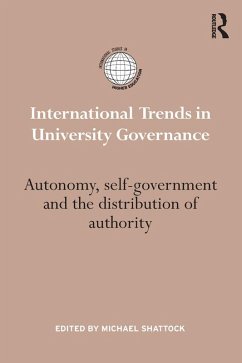One aspect of 'modernisation', particularly important in many European systems, and in Japan, has been the decision by governments to give institutions greater autonomy, more control over their budgets and legal responsibility for the employment of their staff. International trends to introduce greater competition between institutions, to encourage greater institutional differentiation and give greater play to market forces has led to an emphasis on leadership, a more systematic involvement of external stakeholders and a more 'corporate style of governance. At the same time this has often led to a sense of loss of collegiality, a redistribution of authority and a growing gap between the 'centre' and the 'periphery' within universities.
This book analyses governance change in nine major higher education systems, Australia, Finland, France, Germany, Italy, Japan, Norway, the UK and the USA, each account being the result of independent research by a leading authority in the field and describes how a convergence of governance structures has been mediated by the historical, cultural, political and social characteristics of the different systems. Michael Shattock is a leading authority on university governance; this study offers the most up to date account of governance reform in a range of higher education systems, an analysis of the common trends and an assessment of their impact on the idea of a university. It will be essential reading for academics, postgraduates and practitioners in higher education.
Dieser Download kann aus rechtlichen Gründen nur mit Rechnungsadresse in A, B, BG, CY, CZ, D, DK, EW, E, FIN, F, GR, HR, H, IRL, I, LT, L, LR, M, NL, PL, P, R, S, SLO, SK ausgeliefert werden.









